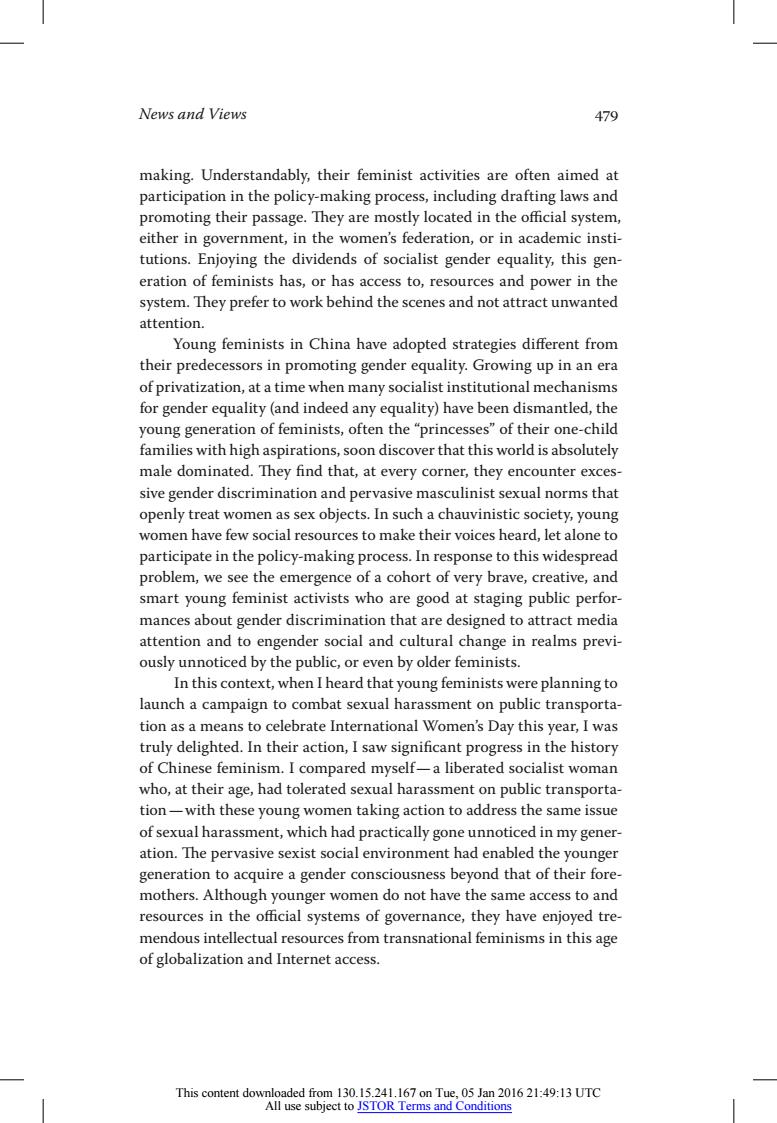正在加载图片...

News and Views 479 making.Understandably,their feminist activities are often aimed at participation in the policy-making process,including drafting laws and promoting their passage.They are mostly located in the official system, either in government,in the women's federation,or in academic insti- tutions.Enjoying the dividends of socialist gender equality,this gen- eration of feminists has,or has access to,resources and power in the system.They prefer to work behind the scenes and not attract unwanted attention. Young feminists in China have adopted strategies different from their predecessors in promoting gender equality.Growing up in an era of privatization,at a time when many socialist institutional mechanisms for gender equality(and indeed any equality)have been dismantled,the young generation of feminists,often the "princesses"of their one-child families with high aspirations,soon discover that this world is absolutely male dominated.They find that,at every corner,they encounter exces- sive gender discrimination and pervasive masculinist sexual norms that openly treat women as sex objects.In such a chauvinistic society,young women have few social resources to make their voices heard,let alone to participate in the policy-making process.In response to this widespread problem,we see the emergence of a cohort of very brave,creative,and smart young feminist activists who are good at staging public perfor- mances about gender discrimination that are designed to attract media attention and to engender social and cultural change in realms previ- ously unnoticed by the public,or even by older feminists. In this context,when I heard that young feminists were planning to launch a campaign to combat sexual harassment on public transporta- tion as a means to celebrate International Women's Day this year,I was truly delighted.In their action,I saw significant progress in the history of Chinese feminism.I compared myself-a liberated socialist woman who,at their age,had tolerated sexual harassment on public transporta- tion-with these young women taking action to address the same issue of sexual harassment,which had practically gone unnoticed in my gener- ation.The pervasive sexist social environment had enabled the younger generation to acquire a gender consciousness beyond that of their fore- mothers.Although younger women do not have the same access to and resources in the official systems of governance,they have enjoyed tre- mendous intellectual resources from transnational feminisms in this age of globalization and Internet access. This content downloaded from 130.15.241.167 on Tue,05 Jan 2016 21:49:13 UTC All use subject to JSTOR Terms and ConditionsNews and Views 479 making. Understandably, their feminist activities are often aimed at participation in the policy-making process, including drafting laws and promoting their passage. They are mostly located in the official system, either in government, in the women’s federation, or in academic institutions. Enjoying the dividends of socialist gender equality, this generation of feminists has, or has access to, resources and power in the system. They prefer to work behind the scenes and not attract unwanted attention. Young feminists in China have adopted strategies different from their predecessors in promoting gender equality. Growing up in an era of privatization, at a time when many socialist institutional mechanisms for gender equality (and indeed any equality) have been dismantled, the young generation of feminists, often the “princesses” of their one-child families with high aspirations, soon discover that this world is absolutely male dominated. They find that, at every corner, they encounter excessive gender discrimination and pervasive masculinist sexual norms that openly treat women as sex objects. In such a chauvinistic society, young women have few social resources to make their voices heard, let alone to participate in the policy-making process. In response to this widespread problem, we see the emergence of a cohort of very brave, creative, and smart young feminist activists who are good at staging public performances about gender discrimination that are designed to attract media attention and to engender social and cultural change in realms previously unnoticed by the public, or even by older feminists. In this context, when I heard that young feminists were planning to launch a campaign to combat sexual harassment on public transportation as a means to celebrate International Women’s Day this year, I was truly delighted. In their action, I saw significant progress in the history of Chinese feminism. I compared myself— a liberated socialist woman who, at their age, had tolerated sexual harassment on public transportation —with these young women taking action to address the same issue of sexual harassment, which had practically gone unnoticed in my generation. The pervasive sexist social environment had enabled the younger generation to acquire a gender consciousness beyond that of their foremothers. Although younger women do not have the same access to and resources in the official systems of governance, they have enjoyed tremendous intellectual resources from transnational feminisms in this age of globalization and Internet access. This content downloaded from 130.15.241.167 on Tue, 05 Jan 2016 21:49:13 UTC All use subject to JSTOR Terms and Conditions